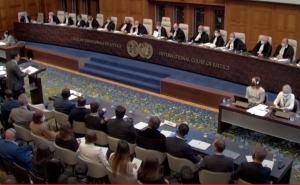ECHR Delivers Advisory Opinion on Robert Kocharyan’s Case

The European Court of Human Rights (ECHR) has delivered an advisory opinion on former Armenian President Robert Kocharyan’s case sought by the Constitutional Court of Armenia, Panorama.am reports.
The court, delivering its second advisory opinion after Protocol 16 to the European Convention on Human Rights came into force in 2018, held that it could not answer the first two questions put by the Armenian top court.
The questions asked by the Constitutional Court were worded as follows:
1) Does the concept of ‘law’ under Article 7 of the Convention and referred to in other Articles of the Convention, for instance, in Articles 8-11, have the same degree of qualitative requirements (certainty, accessibility, foreseeability and stability)?
2) If not, what are the standards of delineation?
In particular, ECHR could not find any direct link between the questions and the ongoing domestic proceedings, which have been brought against former Kocharyan for allegedly attempting to overthrow the constitutional order in 2008.
The Constitutional Court’s third question was whether a provision which defined a crime and referred to a legal act with supreme legal force and a higher level of abstraction could meet the Convention requirements of certainty, accessibility, foreseeability and stability.
The court found that such a provision, using the “blanket reference” or “legislation by reference” technique in criminalizing acts or omissions, The referencing provision and the referenced provision, read together, had to enable individuals to foresee, if need be with the help of legal advice, what conduct would make them criminally liable.
Among other things, the most effective way of ensuringclarity and foreseeability was for the reference to be explicit and for the referencing provision to set out the constituent elements of the offence.
The Constitutional Court’s fourth question concerned the criteria under Article 7 (no punishment without law) of the European Convention for comparing two different versions of a legal act for their compatibility with the principle of the non-retroactivity of criminal law. The court found that such assessments had to take account of the specific circumstances of the case (the principle of concretisation) rather than be carried out in the abstract.
The full text of the advisory opinion can be accessed here.
-
 17:08
17:08The regular session of the Anti-corruption Policy Council takes place in Jermuk
-
 15:05
15:05The Prime Minister sends congratulatory messages to the supreme leader of Iran and the President of Iran
-
 11:11
11:11Armenia sends earthquake aid to Turkey
-
 10:43
10:43Commemoration of the Pontiff St. Sahak Partev
-
 09:16
09:16Some roads are closed and difficult to pass in Armenia
-
 19:55
19:55Phone conversation of the Foreign Minister of Armenia with the U.S. Assistant Secretary of State for European and Eurasian Affairs
-
 18:30
18:30Prime Minister Pashinyan and President Khachaturyan meet
-
 18:20
18:20Ararat Mirzoyan with Co-Chairman of the OSCE Minsk Group of France Brice Roquefeuil
-
 17:01
17:01Humans could land on Mars within 10 years, Musk predicts
-
 16:45
16:45France, US urge 'immediate' end to Nagorno Karabakh blockade
-
 16:01
16:01Blockaded Nagorno Karabakh launches fundraiser to support quake-hit Syria
-
 15:59
15:59Earthquake death toll in Turkey rises to 18,342
-
 15:43
15:43Ararat Mirzoyan Held a Telephone Conversation with Sergey Lavrov
-
 15:06
15:06French president rules out fighter jet supplies to Ukraine in near future
-
 14:47
14:475 Day Weather Forecast in Armenia
-
 14:44
14:44President Vahagn Khachaturyan wrote a note in the book of condolences opened in the Embassy of Syria in Armenia
-
 14:20
14:20Azerbaijan’s provocations impede establishment of peace and stability – Armenian FM tells Russian Co-Chair of OSCE MG
-
 12:57
12:57France representation to OSCE: Paris calls on Azerbaijan to restore freedom of movement through Lachin corridor
-
 11:40
11:40Command of Kosovo forces highly appreciated preparation of Armenian peacekeepers
-
 10:16
10:16The United States withdrew from sanctions against Syria for six months the provision of assistance after the earthquake
day
week
month
Humidity: 36%
Wind: 1.54 km/h









